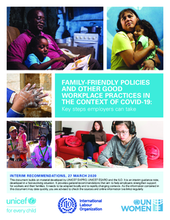The consequences of the coronavirus disease (COVID-19) outbreak are unprecedented and felt around the world. The pandemic is heavily affecting labour markets and economies, including global supply chains, leading to widespread business disruptions. With many businesses struggling to survive, loss of jobs and income and rising working poverty are a reality for many workers. Self-employed, domestic and care workers and those in casual or temporary agency employment are at particular risk. The absence of adequate social protection systems exacerbates working families’ vulnerability to the crisis.
For many children and their families, the fast-evolving situation means disrupted education and childcare, family illness and potential loss of household income. Restrictions on free movement and the socio-economic fallout of the crisis put children at heightened risk of abuse, neglect and violence. In the context of school and childcare closures, domestic care responsibilities for working parents, especially women, have increased considerably during the crisis.
By giving working parents the time, information, services and resources they need to cope with the crisis, family-friendly policies and practices can make a critical difference. They also make an important contribution to wider social protection. Employment and income protection, paid leave to care for family members, flexible working arrangements and access to quality, emergency childcare are important measures that enable workers to protect and care for themselves, their children and their relatives. Employers can also play an important role in gathering and reporting sex-disaggregated data on how the situation is particularly affecting women.
This preliminary technical note from UNICEF, ILO, and UN Women offers (interim) recommendations for employers to mitigate the negative consequences stemming from COVID-19. The note urges employers to consider the impact of their business decisions on workers’ families – and to support social protection wherever possible. It also calls on governments to strengthen social protection measures, especially for vulnerable families, including by supporting employers to continue providing employment and income, and to guarantee financial support for those who lose their jobs.
The preliminary recommendations for employers to mitigate the negative consequences stemming from COVID-19 include:
- Monitor and follow national advice by local and national authorities and communicate critical information to the workforce.
- Assess whether current workplace policies provide sufficient support to workers and their families.
- Apply good practices when implementing existing or new policies based on social dialogue, national labour laws and international labour standards. Ensure all workers are entitled to workplace support measures, without discrimination, and that all workers know about them, understand them and feel comfortable using them.
- Protect the workplace against discrimination and social stigma by facilitating training and ensuring reporting mechanisms are confidential and safe.
- Implement family-friendly working arrangements to give workers greater freedom of when and where they can fulfil their job responsibilities. If flexible working arrangements are not possible, consider alternative support for working parents such as childcare support.
- Support working parents with childcare options that are safe and appropriate in the context of COVID-19.
- Prevent and address workplace risks by strengthening occupational safety and health measures.
- Provide guidance and training on occupational safety and health measures and hygiene practices.
- Encourage workers to seek appropriate medical care in cases of fever, cough and difficulty breathing.
- Support employees coping with stress during the COVID-19 outbreak.
- Support government social protection measures in line with ILO Social Security (Minimum Standards) Convention No. 102 and ILO Social Protection Floors Recommendation No. 202. Company support can include, for example, subsidies for workers to access health, unemployment and inability to work insurance, and should extend to workers in the informal sector.

